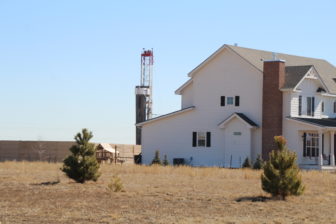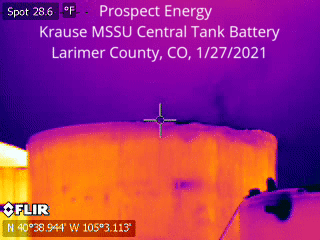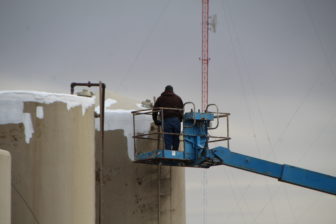Following our recent fieldwork in late January, Earthworks’ CO field staff returned to many of the same communities in the Front Range. Frontline residents remain concerned about new fracking facilities that are entering pre-production and the continued health impacts from existing production facilities.
We visited 40 oil and gas facilities in 10 different communities from March 2-4 and documented video evidence of oil and gas pollution at more than half of these facilities. For the most significant and concerning emission events, we will soon file complaints with Colorado regulatory agencies CDPHE and COGCC.
Dawn of a New Era?
In 2020, the COGCC and CDPHE undertook rulemakings in line with the passage of Senate Bill 181. The legislation, signed by Governor Polis, mandated that public health and the environment be prioritized above the interests of oil and gas. The COGCC specifically adopted new rules that require a 2000 ft setback from homes and schools for all new oil and gas facilities and that make other improvements to operational practices to reduce impacts on the environment and nearby residents.
| However, those paying attention to the reality on the ground in the last few months are realizing that celebrations about a culture change at COGCC for the better were premature. |
These new rules, which went into effect on January 15th, 2021, were celebrated as an important turning point in CO’s relationship with oil and gas development. However, those paying attention to the reality on the ground in the last few months are realizing that celebrations about a culture change at COGCC for the better were premature.
During this round of fieldwork we looked at five new large-scale fracking developments near communities like Colliers Hill in Erie, Fairfield in Thornton, Longmont, and Greeley, many of which are much closer than 2000 ft to homes, and noted many more fracking developments entering into pre-production along the I-25 corridor.

The facilities that are being fracked within an unsafe distance to homes had been permitted and approved prior to the new rules being adopted but this is no consolation to a new generation of Front Range families who are right now experiencing firsthand the horrors of living next to fracking and will have to contend with living in close proximity to a polluting facility for years or decades to come.
SB-181 was sold as a ray of hope that people would be prioritized above a polluting industry, but Coloradans are still waiting, even after new rules have now been put in place, for meaningful change. Unfortunately, the longer we have to wait, the more harm that the oil and gas industry will continue to do to our health and environment.
Spotlight on Larimer County
To date, we have not conducted extensive fieldwork in Larimer County, partly because it has fortunately avoided the widespread oil and gas development that plagues neighboring Weld County. However, in January, we highlighted the emissions that we documented from an oil and gas facility north of Fort Collins that was the source of odors and was contributing to health concerns for nearby residents.
We filed a complaint with CDPHE and some of the local residents filed complaints as well, which prompted CDPHE to launch an investigation that has resulted in the operator having to make repairs to several poorly maintained waste and storage tanks on site.

In March, we documented emissions from the storage tank battery on site. While the waste tank we filmed in January was no longer emitting, the odors from the storage tank battery were consistent and intense while we conducted our fieldwork from the adjacent county road. A few days after we left the site we heard from community members that the operators had made additional repairs and that they detected NO odors from the site (for the first time in years).
This result was a welcome victory for the community members who are now enjoying a reprieve from the pollutants they had been exposed to but it also serves to illustrate the desperate need for more regulatory action and enforcement from the CDPHE to put an end to harmful pollutants from oil and gas (72 of our 82 complaints to CDPHE have not lead to any reduction in oil and gas pollution and community harm: read more here)

This example also highlights the fact that Larimer County is not safe from the harmful impacts of oil and gas, which makes it imperative that the County leadership take action to protect their residents and environment.
We applaud the Commissioners for their recent decision to institute a 30-day moratorium on all new oil and gas permits in the county as they take the time to revise local regulations and urge the Commission to extend this moratorium beyond April 15th for as long as it takes to create strong, protective regulations. We also urge the Commission to take advantage of the authority granted to them by SB-181 to go beyond the regulatory minimum established by the COGCC and to craft rules that prioritize the health and safety of Larimer residents, including those who are currently residing close to polluting oil and gas facilities.
Visit our CO campaign website for more information about our work (en Español)
